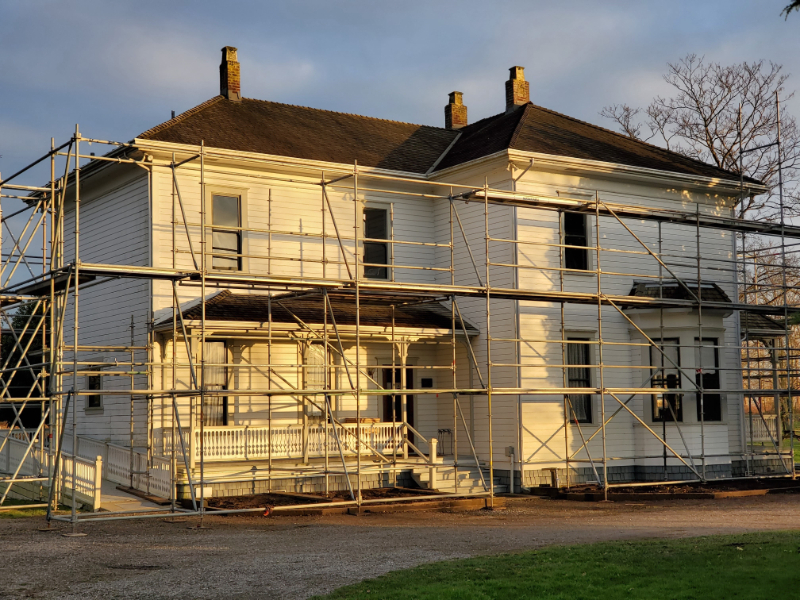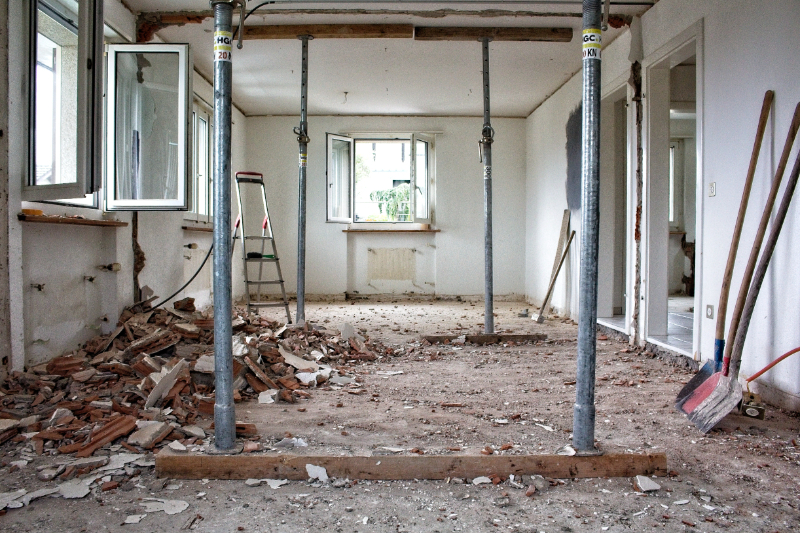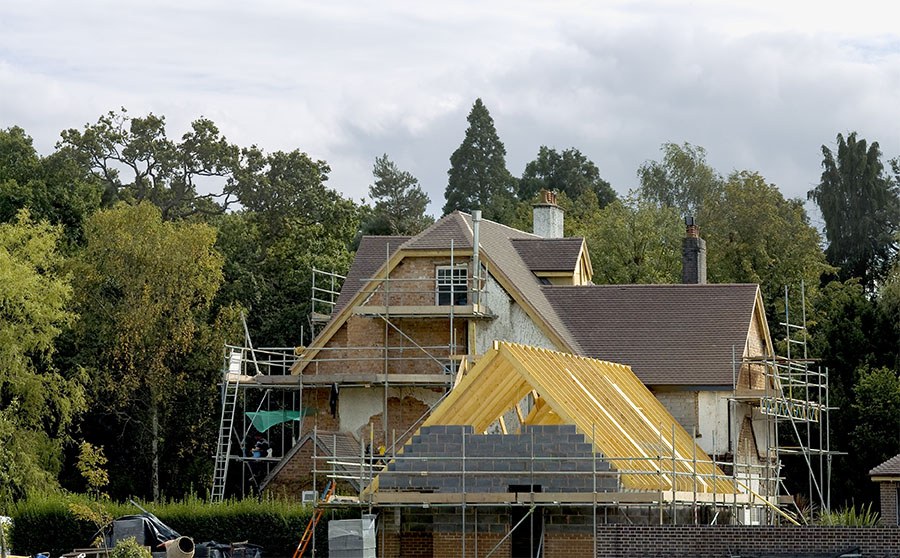How much would it cost to build an extension? Find out more about the costs involved in building an extension in the UK.
Bob Trimble is a chartered architect registered with RIBA with 30 years experience in the industry. Trimble Architects work throughout Hounslow, Twickenham, Richmond, Kingston Upon Thames, Teddington and the surrounding areas of London.
Extension cost breakdown
The overall cost of building an extension will depend on a lot of different factors, most notably the size of the new space and how it's intended to be used. Put simply, the smaller and less complex the extension, the cheaper it will be.
Some other factors can play a role in costs, such as the location of the building and the materials used. Below we break down the average costs and the expected timelines for different types and sizes of house extensions- from budget to luxury.
Costs per Extension Type
Budget (per SQM)
- Single-Storey = £1,000 - £1,600
- Two-Storey = £1,200 - £1,900
- Side Return = £1,500 - £1,900
- Glass = £1,350 - £1,950
- Flat Pack = £750 - £1,440
Mid Range (per SQM)
- Single-Storey = £1,700 - £2,000
- Two-Storey = £2,200 - £2,200
- Side Return = £1,900 - £2,200
- Glass = £1,800 - £2,300
- Flat Pack = £1,275 - £1,800
Luxury (per SQM)
- Single-Storey = £2,200 - £4,000 and up
- Two-Storey = £2,300 - £4,000 and up
- Side Return = £2,200 - £2,500
- Glass = £3,000 and up
- Flat Pack = £1,650 - £3,600
Time Required per Extension Type
- Single-Storey = 8-10 weeks
- Two-Storey = 12-16 weeks
- Side Return = 10-12 weeks
- Glass = 10-12 weeks
- Flat Pack = 1-2 weeks
Be aware that the cost estimates are given above only encompass the shell of the extension build, not any additional fittings, fixtures or other internal works. You choose these aspects yourself, and the cost can vary depending on your wants, needs and taste. The estimates do factor in VAT, as most builders are VAT registered. Factor the additional costs into your initial budget, don't just base it on the generalised estimates.
Why add on a home extension
Building an extension onto your home can be one of the most rewarding and exciting times! You're getting to extend a space you already cherish instead of dealing with the hassle of moving into a new house. An extension can be added to increase the size of an existing room, add an extra room or even maybe an entirely new floor.
It can be satisfying to see your beloved home transform into a more functional space for your new needs without losing the charms you first fell for. Furthermore, you will save money from moving fees, down payments and deposits, not to mention the hassle of moving your personal belongings.
Is an Extension Right for Your Home
Before looking into the specific cost of a house extension, you need to determine what type of extension will work best for your vision, your space and your needs.
Your choice should also be guided by your budget, including the additional costs from internal additions. If you're certain the house you live in is your forever home, an extension may be a no-brainer when you're in need of some additional space.
An extension is more financially viable than moving home when considering solicitor fees, stamp duty fees and other costs. Moreover, building an extension to your existing home increases the overall value of the property, meaning you can ask for a higher price from buyers when coming to sell.
Although, you should be aware that drastically increasing the size of your home can move you into a higher tax bracket.
Simply, if you're planning on adding an extension to your home and want to sell in the future, you should ensure the cost of the extension doesn't surpass the value added to your home.
Speaking to local estate agents and personal research can guide you on the ceiling prices in your area before initiating the project.

Types of home extensions
A variety of factors will determine the type of extension you end up choosing, and there are many options to extend your home. Below we list the most common types of extensions built by Trimble Architects;
Single storey extensions
Multi-storey extensions
Semi-detached extensions
Kitchen extensions
Bathroom extensions
Garage conversions
Loft conversions
Basement extensions
Factors affecting the average house extension cost
There's a lot to consider when building a new home extension. The complex process begins with structural work (foundations, walls, roofs) and then moves on to the 'fit for living' work (plumbing, electricity, plastering). Generalised cost estimates for extensions are based on average market, plumbing and electrical costs.
The estimates do not include any specialised equipment that may be used or additional extras from skylights to safety features. Below we break down the key factors that will influence the cost of a house extension.
The build cost (labour & materials) is usually the most expensive part of the project. Smaller and less complex extensions will obviously cost less as less material and labour are required. However, it does work out cheaper if you decide to build a double-storey extension rather than a single-storey, as either way, a roof and foundations are required. Double-storey extensions will only require additional walls and floor joists, as well as interior finishes.
General costs don't consider the location of the build. As expected, areas of 'higher-value' such as Conservation sites, or the South of England, will charge more than other locations.
It's expected builders will have easy access to the correct tools and machinery, although the need for specialist tools or additional entry can increase the price. In more obscure locations, this is when costs can dramatically rise.
Every extension is different. The materials used, the complexity of the design and the skill of the workers will impact whether you pay more or less than the local market rates. Too low quality can damage this increase in house value, whilst too high quality will cost more than the increase in house value. So ensure the maths work out!
In a CheckaTrade 2019 HomeOwners Survey, it was found that 27% of homeowners believe planning permission is the biggest barrier when embarking on a home extension project. Luckily for some, certain extensions fall under your 'permitted development rights and don't require planning permissions.
Although hiring an architect may present an additional upfront cost, over the course of the project, having them there to guide you will save a LOT of money. The architect can assist you in curating the perfect extension design with accurate measurements, set quotes and assistance with planning permission applications. They work based on a percentage rate or a flat fee.
The finishing touches, from bespoke flooring to complex kitchen units, should be factored into the initial cost plans. The level of finish you desire will impact the cost, so don't let luxurious choices ruin smart budgeting throughout construction.
The integrity of the extension will be determined by the essential groundwork completed at the beginning of the project. As an important foundation for the entire extension, you shouldn't cut any corners, working with the best-suited materials. Additional costs can come from the soil type, the need for tree removal, and the need for drains to be moved. Cost guides are based on average foundation depths with no serious complications.
You must inform your home and contents insurer of any new additions or extensions to your home as it can increase the premium. It may be easy to forget, but it can leave you uncovered during potentially risky developmental work. Make sure contact is made before the project begins, and ensure at the end of the build, the extension is added into the policy.
Removing any obstacles, such as trees or shrubs, from the extension build area will incur an additional cost. The extent of removal will determine the overall removal and repair costs. Furthermore, contaminated materials may need to be removed and safely disposed of, again increasing the overall cost.
You'll also need to consider the windows and doors needed after the structure has been built. The type of glazing, or design of the windows, like a bay window, will cost more than a standard window. These plans should be decided upon in initial planning as they're an integral part of the structure.
Last but not least, the part that brings it all together- decorating! The way you choose to decorate the new space will directly impact costs, with higher quality and luxury decorations costing more. Consider buying second-hand or upcycling vintage pieces, to save some money and add some character to your home.
How Much Does An Extension Cost
As discussed, the cost of an extension will depend on a variety of factors in and out of your control. On average, an extension project can cost around £1,350 to £2,250 per m² of added internal space. Using the general estimate, a new 15m² bathroom would cost between £20,250 to £35,000 (plus 20% VAT).
The large range is owed to the generic use of materials and labour without singling out any additional costs. Contacting a local estate agent, architect or project management company can guide you to a more exact price based on your requirements and design.
Some of the factors that influence the overall cost of an extension project include;
- Number of storeys
- Size & Shape
- Quality of Build
- Build Route
- Window Glazing
- Standard living room or more complex Kitchen/Bathroom extension
Further costs can come from external requirements or contractors, including;
- Architect fees (around 7% of construction cost)
- Surveys (£700-£1,800)
- Planning Permission (£206 for a two-storey extension in the UK, also depends on local authority).
- Structural engineer (£500-£1,250)
- Party Wall Agreement (£1,000-£2,000, location can impact this).
- Building Regulations application forms
- Lawful Development Certificate (£103)
- Fitting out the extension (depends on how you plan on using the new space)
- Increase in Insurance premiums & worksite insurance (if needed)

Single Storey Extension Costs
A simple, single-story, boxed-shaped extension will cost around £1,350-£1,750/m². Although, these prices can easily fluctuate based on location and quality of finish, as visualised below. An excellent finish on the new extension can increase the cost by up to 40%! Whilst in certain 'high-value' areas, such as London, an extension can cost even more!
Basic quality: £1,350 - £1,650/m²
Good quality: £1,700 - £2,000/m²
Excellent quality: £1,800 - £2,500/m² and up
Double Storey Extension Costs
Opting for a double-storey extension rather than a single one increases economies of scale, as either way, a roof and foundations are required. All that would be needed are new walls and floor joists, along with extra fixtures and interior finishes. The average cost for a double-storey extension is around £1,250-£1,650m², although the quality of interior finishes can increase costs.
Basic quality: £1,350 - £1,650/m²
Good quality: £1,700 - £2,000/m²
Excellent quality: £1,800 - £2,500/m² and up
Side Extension Costs
The size, location and quality of the build will all affect the cost of the extension. The cost of a side extension can vary depending on whether it's single or double-storey and the number of new walls needed.
Some side extensions may benefit from using an existing party or boundary wall. There are no set cost guidelines for this type of extension, it's best to consider the average costs for single or double-storey extensions, and then plus or minus based on additional costs.
Ensure you have a good idea of the budget for the extension before initiating the project, you can do this by contacting our trusted and knowledgeable Trimble Architects team for a quote.
Conservatory Extension Costs
Each design and type of conservatory comes with its own cost range. A cheaper lean-to uPVC extension structure can cost around £5,000, depending on size. Whilst, more complex designs like Edwardian or L-, P- and T-shaped conservatories will cost much more, averaging between £10,000 and £15,000 when built with PVCu. Costs can further increase based on the type of frame used for the conservatory; for instance, an oak frame can have to range between £30,000 to £40,000.
Basement Extension Costs
A basement extension is different from the other types as it's built under an existing structure. Some key factors that will influence the overall cost include; soil type, party walls, location, type of property, site access, local authoritative restrictions and size of the existing basement.
Waterproofing and preparing a basement for finishing touches can cost anywhere between £20 to £25,000 and upwards, depending on the age of the house, space and relevant issues.
When there is excavation and underpinning required to increase the existing space and headroom, prices can start from £3,000 to £4,000 per m².
The cost can range depending on the intended use of the new basement space; for example, a wet room will cost more owed to the additional plumbing and waterproofing needed.

Architects Near Me
If you are looking for architectural services throughout Hounslow, Twickenham and the greater London area, then get in contact with our team today. We can offer advice and begin guiding you towards making the right decision.
Bob Trimble is a chartered architect registered with RIBA. Bob Trimble has 30 years of experience working with residential and commercial property projects. For 4 years, Bob Trimble has worked from his housing association and private architectural practice for clients throughout Hounslow, Twickenham, Richmond, Kingston Upon Thames, Teddington and the surrounding areas of London.


